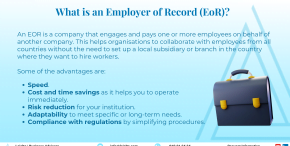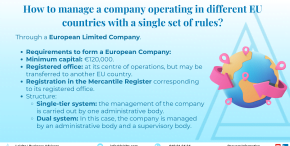![]() There are many ways and options for setting up a business in Spain as a foreigner. From operating through a non-permanent establishment to setting up branch or subsidiary companies, there is a solution for every need. Nevertheless, whatever option you choose the most important feature is to develop your business activity without fearing any penalties or files for not doing things right. Today we will examine the mercantile commitments of a subsidiary company in Spain as this type of company is one of the most interesting options to set up a business in Spain in a transparent and efficient way. Do you want to know more about this subject? In this first post we will explain you all you need to know about mercantile commitments. Do not miss it!
There are many ways and options for setting up a business in Spain as a foreigner. From operating through a non-permanent establishment to setting up branch or subsidiary companies, there is a solution for every need. Nevertheless, whatever option you choose the most important feature is to develop your business activity without fearing any penalties or files for not doing things right. Today we will examine the mercantile commitments of a subsidiary company in Spain as this type of company is one of the most interesting options to set up a business in Spain in a transparent and efficient way. Do you want to know more about this subject? In this first post we will explain you all you need to know about mercantile commitments. Do not miss it!
Mercantile commitments of a subsidiary company in Spain. What is a subsidiary company?
Before focusing on the mercantile commitments of a subsidiary company in Spain, let’s see what does this type of company consists of and why it can be interesting when setting up a business in Spain as a foreigner. According to Pymesyautonomos.com, a subsidiary company belongs to a holding company or corporate group. The group includes a parent company that owns the majority of the shares and controls the subsidiary company. In this situation, the parent company would be the existing one and the subsidiary, the company you are going to set up in Spain to start making business in our country.
It you have decided to open a subsidiary company in Spain to internationalize your business activity, this new company will be under the Spanish tax regulations and will pay taxes in our country. On the other hand, the benefits it generates will be subject to withholding taxes; it is essential to verify if your country’s government has any double taxation agreements with the Spanish government in order to prevent your company from paying taxes twice. From the accounting point of view, you must take into consideration that the subsidiary company cannot offset losses with the parent company. But all the payments made to the parent company through interests, charges or patents can be deducted.
Accountant and mercantile commitments for subsidiary companies: how to file them
Among the mercantile commitments that must be filed by a subsidiary company in Spain there are three basic types regulated by the Spanish law: accounting obligations, mercantile obligations and tax obligations. They are listed in the Código de Comercio (from Article 34 to Article 40), the Reglamento del Registro Mercantil (from Article 365 to Article 378) and in the Ley de Sociedades de Capital (more specifically and in detail).
Accounting obligations involve keeping the accounting registers to the date: P&L and issued/received-invoices books. On the other hand, in order to meet the mercantile commitments of a subsidiary company in Spain the companies must file in the following in front of the Spanish authorities:
- Statutory Accounts Filing. Subsidiaries must file their own Annual Accounts in Spain, attaching the Approval Certificate issued by the company administrator together with the General Shareholders Minute. This obligation is listed in the Art. 279 – Ley de Sociedades de Capital. Annual Accounts must be filed one month after the approval of the accounts by the Board of Directors; this approval must be done during the first 6 months after company year-end. For instance, if we have a year-end the 31th December, 2018 we should file our annual accounts on 30th July, 2019. This will be the first statutory accounts to be filed, as the company was registered in 2018.
- Official Books. All subsidiaries must keep Official Books to be filed in front of the Mercantile Register four months after the year-end of the company. According to our example, we should file Official Books on 30th April, 2019. All the documents should be prepared per the Spanish mercantile law, posting the Spanish entries with all the related information we have in Spain (Invoices received and issued, Spanish monthly payroll postings, bank entries etc.).The information to be filed includes:
- Quarterly Spanish Balance Sheet, formed by Spanish accounting postings
- Quarterly Spanish P&L account
- Journal Book with all the Spanish accounting entries.
- General Ledger of the Spanish accounting year.
- Shareholders Registration Book
- Contract Book (only for Unipersonal Companies)
- General Shareholders Minute
- Unipersonal Declaration. Established by Art. 13 Ley de Sociedades de Capital. If the company constitution includes a declaration of this situation, it must appear in Public deed and be registered in the Mercantile Register. And of course, it is necessary to specify in each document the expression S.L.U.
Professional advice and management: your best tools
It is crystal clear: keeping the mercantile commitments of a subsidiary company in Spain up to date requires time, work and a good knowledge of the Spanish tax regulations. And do not forget the language barrier! If you feel somewhat overwhelmed, don’t worry: there is a solution. The advice and support provided by a professional consultancy with expertise in setting up business in Spain will be your best tool. In Leialta we invite you to learn about our specialized services through which we help many foreign entrepreneurs to fulfill their mercantile commitments of a subsidiary company in Spain. Contact us and we will find the way to help you too.
Do you want to know more about the tax commitments of a subsidiary company in Spain? In our nets post we will explain you which they are, the documentation to be filed in front of the Spanish authorities and how to do things right. Meanwhile, leave us a comment!



